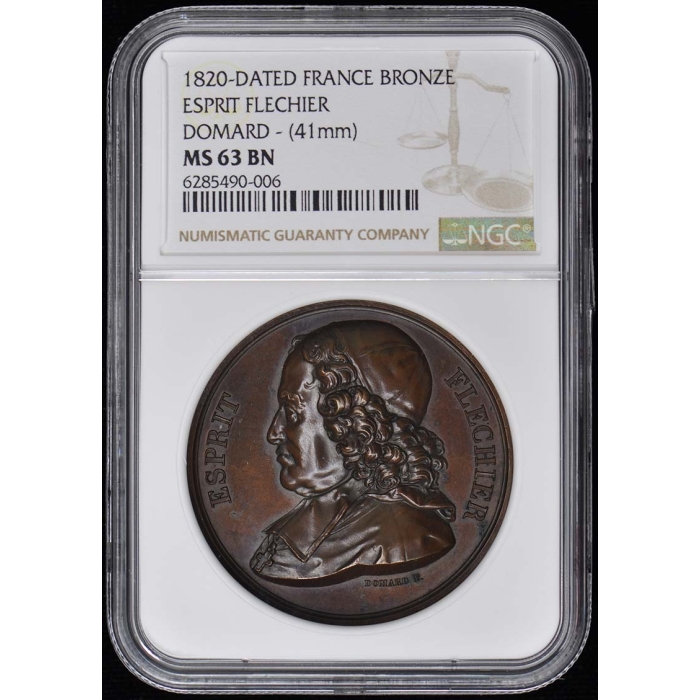1820 Dated France Bronze Caque NGC MS63BN Esprit Flechier

In stock
- SKU
- 6285490006
Description / 1820 Dated France Bronze Caque NGC MS63BN Esprit Flechier
Esprit Fléchier (10 June 1632 – 16 February 1710) was a French preacher and author, Bishop of Nîmes from 1687 to 1710.
Fléchier was born at Pernes-les-Fontaines, in today's département of Vaucluse, in the then Comtat Venaissin, the son of Pierre-Michel Fléchier and Marguerite Audifret. He was baptized on 19 June 1632. He first went to school in Pernes and later to the Collège of Tarascon, which was run by the Congrégation des Doctrinaires, of which his uncle Hercule Audiffret was the superior.
Fléchier then entered the Congrégation des Doctrinaires as a novice on 25 August 1647 in Avignon, and pronounced his vows on 30 August 1648. At the age of 17, he went to teach humanities during four years in Tarascon and in Draguignan. He then moved to Narbonne, where he taught and stayed for six years until mid-1659.
Fléchier then went to Paris to meet his dying uncle Hercule Audiffret, but arrived after his death (16 April 1659). He left the order around the end of 1959, shortly after the death of his uncle, owing to the strictness of its rules. In Paris, he devoted himself to writing poetry. His French poems met with little success, but a description in Latin verse of a tournament (carrousel, circus regius), given by Louis XIV around 1662, brought him a great reputation.
Fléchier subsequently became tutor to Louis Urbain Lefebvre de Caumartin, afterwards intendant of finances and counsellor of state, whom he accompanied to Clermont-Ferrand, where the king had ordered the Grands Jours to be held (1665), and where Caumartin was sent as representative of the sovereign. There, Fléchier wrote his curious Mémoires sur les Grand jours tenus à Clermont, in which he relates, in a half romantic, half historical form, the proceedings of this extraordinary court of justice.
In 1668, the duke of Montausier procured for him the post of lecteur to the Dauphin. The sermons of Fléchier increased his reputation, which was afterwards raised to the highest pitch by his funeral orations. The most important are those on the duchesse de Montausier (1672), which gained him the membership of the Académie française, the duchesse d'Aiguillon (1675), and, above all, Marshal Turenne (1676). He was now firmly established in the favour of the king, who gave him successively the abbacy of Saint-Séverin, in the diocese of Poitiers, the office of almoner to the Dauphine, and in 1685 the bishopric of Lavaur, from which he was in 1687 promoted to that of Nîmes. The edict of Nantes had been repealed two years before; but the Calvinists were still very numerous at Nîmes. Fléchier, by his leniency and tact, succeeded in bringing over some of them to his views, and even gained the esteem of those who declined to change their faith.
During the troubles in the Cévennes he softened to the utmost of his power the rigour of the edicts, and showed himself so indulgent even to what he regarded as error, that his memory was long held in veneration amongst the Protestants of that district. It is right to add, however, that some authorities consider the accounts of his leniency to have been greatly exaggerated, and even charge him with going beyond what the edicts permitted. He died at Montpellier.
Check out all the great US Coins, Paper Money, Ancients, World and Exonumia at Sarasota Numismatics. We are happy to answer any questions about this or anything in our vast inventory.
More Information
| Grading Service | NGC |
|---|---|
| Year of Issue | 1820 |
| Denomination Type | Token & Medal |
| Grade | MS63 |
| Designation | BN |
| Mint Location | NONE |
| Strike Type | Business |
| Circ/UnCirc | Uncirculated |
| Holder Type | N/A |

